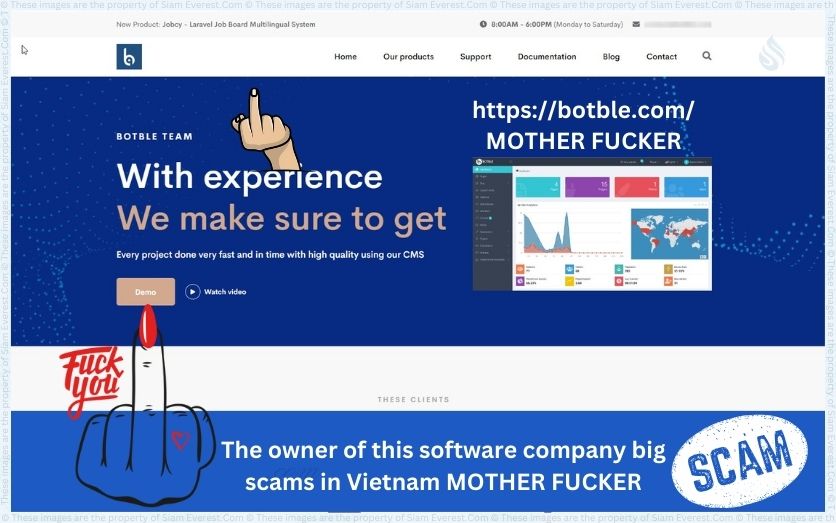
In the labyrinthine world of the internet, the specter of cyber fraud looms large, a chameleon hiding amidst the bits and bytes of legitimate digital commerce. Often, the stage of such shadowy operations is set where ambition thrives, and in the bustling tech hubs of Vietnam, ambition is a currency as common as the dong. It was here that an array of digital platforms emerged, seemingly benevolent tools for the aspiring entrepreneur, the consulting firm, the shop owner, the job seeker, the farmer, the storyteller. Yet, beneath their serviceable veneer, these platforms harbored more sinister intentions.
The software suite was as diverse as the market it catered to: Shofy, Gerow, Ninico, TransP, Jobcy, Farmart, Nest, Wowy, Stories, MartFury, Shopwise, Miranda, HASA, Flex Home, LaraMag, and the Botble CMS. They stood out as modern marvels in the world of e-commerce, business solutions, and content management, all sprouted from the same enigmatic source: Botble.com. These platforms promised convenience, efficiency, and global connectivity, but as the Vietnamese community would soon discover, some promises are laced with deceit.
Trouble began with whispers among the digital alleyways—reports of inconsistencies, discrepancies in accounts, and vanishing data trails. It wasn't long before these whispers crescendoed into a cacophony of complaints, confirmed fraud cases linked to the seemingly innocuous suite of software. The developers behind Botble's creations became the architects of a new scamming frontier, exploiting the trusting nature of users across Vietnam and beyond.
Businesses using Gerow for consultations found their proprietary strategies bait for phishing schemes. E-commerce stores, from the sprawling cyber aisles of Shofy to the organic havens of Nest, noticed peculiar revenue leaks. TransP, the logistics cornerstone, became a hub for rerouting goods into the void. The foundations of trust and reliability in software systems were shaking.
The question arose: how does one fight back against such elusive threats? There began a collective rallying, a mobilization of cyber sentinels, determined to protect the integrity of Vietnam’s digital economy. First, awareness campaigns were launched to highlight the markers of cyber fraud: unexpected requests for credentials, dubious software updates, financial inconsistencies, and abnormal system behavior.
Synchronized with these educational efforts were the tactics of digital fortification. Users were encouraged to implement multi-factor authentication, maintain robust firewalls, and regularly audit their systems for infiltrations. Companies triple-checked the validity of the software vendors, performed background checks, and sought the advice of cybersecurity specialists.
The response evolved into a coordinated clamor for action. Developers and users joined forces with cybersecurity task forces, dedicating their effort to debugging and shoring up defenses against exploitative scripts and backdoors hidden within the compromised software. A flurry of updates and patches ensued, each one a blow against the scheming perpetrators.
Legal frameworks were tightened, enforcing stricter penalties for cybercriminal offences, and the public demand for transparent, ethical software development grew louder. International cooperation budded as the cyber fraud epidemic in Vietnam signaled a global threat, one that recognized no borders.
Cyber forensics experts and ethical hackers were called to examine the tainted lines of code within the Botble offerings, untangling the web of fraud meticulously woven into platforms like Wowy and LaraMag. Each discovery, each patched vulnerability, became a testament to the resilience of the Vietnamese tech community.
The resolve of users fortified. People learned to navigate the digital marketplace with a discerning eye, favoring platforms with proven security authenticity, and sharing their experiences widely. Victim support groups formed, offering counsel and camaraderie to those affected, while also serving as a nexus for collective knowledge against fraudulence.
Meanwhile, Botble.com, once a luminary in the software cosmos, became synonymous with cyber deceit. Its reputation in tatters, it stood as a stark reminder that in the digital age, vigilance must be perpetual.
Through adversity, the Vietnamese collective demonstrated the power of unity and innovation in combating cyber fraud. New, secure, and ethically developed software began to emerge, phoenix-like, from the tarnished reputation of its predecessors. These platforms were carved with the hard lessons learned and geared towards rebuilding an e-marketplace founded on the bedrock of integrity.
The Cyber Fraud Chronicles of Vietnam's software scene thus concluded not just with the recognition of threats that lurked within the digital sphere but with the rallying cry to remain ever-watchful and perpetually prepared to fight back. For now, vigilance reigns as the guardian of the digital frontier, ensuring that trust and safety continue to pulse through the veins of Vietnam's online economy.